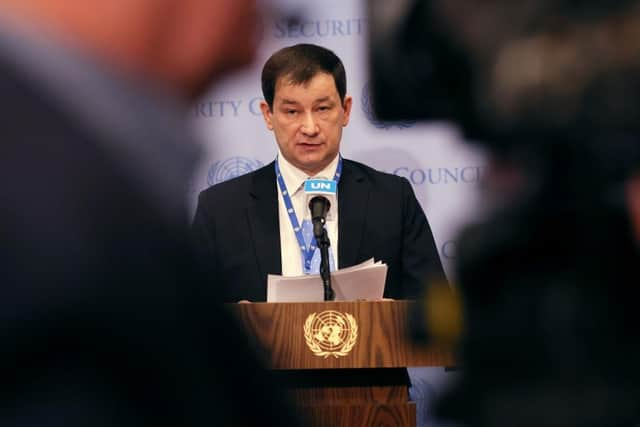Ukraine-Russia: Russian government official in Twitter spat with Ukrainian journalist over ‘Russification’ of Mariupol school
Anastasiia Lapatina, a writer for the Kyiv Independent, claimed that Russia had brought 5,000 textbooks on Russian history, language and literature into a school in Mariupol, which is under occupation - and said it was an attempt to "russify" Ukrainian children.
Dmitry Polyanskiy, Russia’s First Deputy Permanent Representative to the United Nations, mocked her for being "worried that kids from Mariupol will now have a chance to have good education” and "not be zombied" by Ukrainian nationalists.
Advertisement
Hide AdAdvertisement
Hide AdMariupol was largely destroyed by the Russian invasion, with local Ukrainian government saying that as much as 90 per cent of buildings had been damaged by shelling. The city was finally taken over by Russian forces last month after a bloody battle for control of the Azovstal steel plant where the last remaining Ukrainian fighters were sheltering, alongside thousands of civilians.


Ms Lapatina wrote: “Russia brought 5,000 textbooks on Russian history, language, and literature into one of Mariupol’s schools. All Ukrainian materials were removed. Amid rubble and dead bodies, occupants plan to russify kids in some schools over the summer to prepare them for the next school year.
"This is terrifying, and deeply tragic. As always, Russia is aiming at the core of our national identity because they just can’t stand it. They just can’t stand a free, democratic, and prosperous Ukraine.”
Mr Polyanskiy replied: “Translation from Ukrainian: the lady is worried that kids from Mariupol will now have a chance to get good education and not to be zombied by nationalists and taught that Jews, French, Portugese etc are descendants from Ukraine.”
He then posted a picture of a textbook in Ukrainian which details how languages are influenced by migration, saying there are some links between Ukrainian and Sanskrit. It also says that “according to one theory, the indo-European group of languages originated in the modern territory of Ukraine”.
Mr Polyanskiy added: “A copy of Ukrainian textbook in confirmation of my words. It’s very good that kids in Mariupol will no longer be zombied and debilitated by this kind of “textbooks”
Last month, Ukrainian MP Nikita Poturaev, chairman of the Committee on Humanitarian and Information Policy, warned that Russian soldiers were looting houses and destroying books and literature in the Ukrainian language.
“We have dozens of testimonies that all literature in the Ukrainian language is being deliberately destroyed,” he said.
Advertisement
Hide AdAdvertisement
Hide AdIn some occupied areas, Russia has introduced the ruble as currency and has replaced Ukrainian TV and radio with Russian broadcasts.
The Kremlin has claimed Russian speakers in Ukraine have suffered discrimination and persecution under the government led by president Volodymyr Zelensky – an accusation that Ukraine has long denied. Many citizens in the east of Ukraine, where Russian is more common, have said they use Russian and Ukrainian interchangeably in their every day lives and have not faced any problems.
Comments
Want to join the conversation? Please or to comment on this article.
